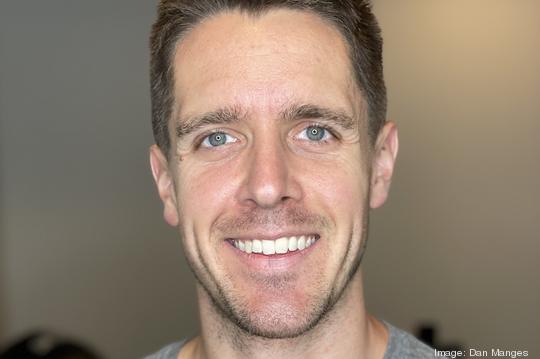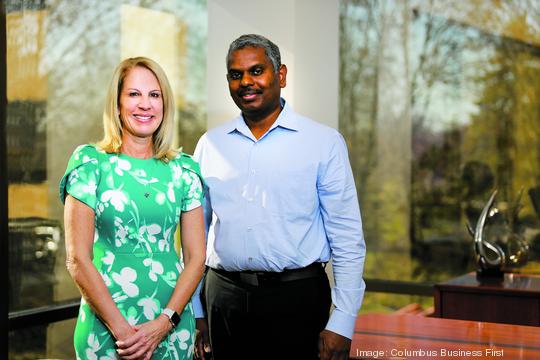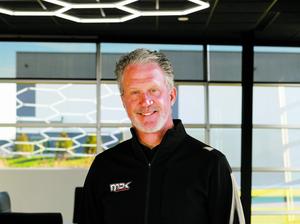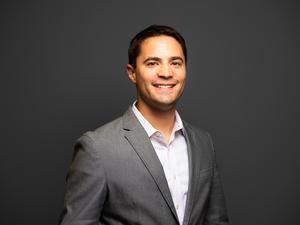After the dizzying record highs for venture capital investing nationwide in 2021, last year represented a return to earth. Funding rounds were more modest and rewarded tech startups that showed they can produce revenue.
As Columbus Inno enters its second full year, we join sister publications across the country in recognizing startups that perhaps few have heard of yet, but we expect to make news in 2023.
The group ranges from companies incorporated last year to one approaching a decade in business, but which has gone through at least two rebirths.
Some have sought no publicity; others made a splash with big funding rounds. One of them, through a combination of “mini-IPO,” investment rounds and credit lines, is closing in on access to $1 billion in capital.
This year’s crop of Startups to Watch represents Central Ohio strongholds of biotech and business-to-business software – but that definitely doesn’t mean they're stodgy. There are even startups in the buzzy fields of esports and cryptocurrency.
SureImpact Inc.
A “classic entrepreneur,” Sheri Chaney Jones saw a problem in her industry, then built software to tackle it by automating her own expertise.
SureImpact Inc. has grown to 250 clients in its second full year on the market, up from 12 in 2020, and is poised for even faster growth in 2023, said Jones, founder and CEO.
“We do expect to see exponential growth next year,” she said.
Social service nonprofits and governmental agencies use the cloud-based subscription software to track and analyze the impact of their work, such as the services an affordable housing developer provides to help people maintain stable housing. They, in turn, can use that data to both secure more funding and improve their effectiveness by boosting what works and eliminating what doesn’t.
“With all of the technological advancements in the world, the nonprofit sector has been woefully underserved,” Jones said. “What SureImpact will offer to our clients you cannot find anywhere else.”
Founded in 2018 with a beta-testing version of the software, Liberty Township-based SureImpact was inspired by Jones' consulting business, Measurement Resources Inc., which she started in 2010 to provide data-driven insights to help nonprofits operate more effectively.
Jones is an in-demand public speaker on metrics for measuring impact. SureImpact has purchased rights from Measurement Resources to a library of 300 best practices templates for various sectors, such as behavioral health or homelessness.
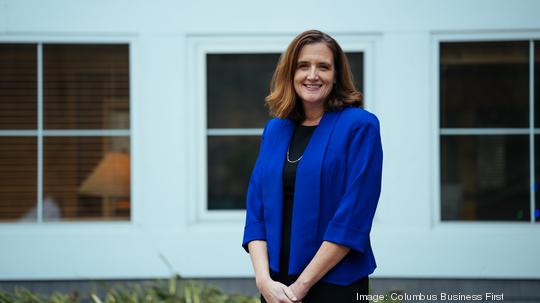
“She’s a classic entrepreneur (who) saw the need and built it initially from passion, but growing it into a product that industries she cares deeply about can benefit from,” said Tom Walker, CEO of Rev1 Ventures.
Jones wrote the specifications for what the software should do and landed a client willing to fund building it, said Randy Dean, president of Revel IT, a Dublin tech staffing firm. Dublin-based AWH has been the contract developer.
“I’m impressed by her,” Dean said in an email.
Rev1 with Queen City Angels and Connetic Ventures led a $1 million seed round in January 2022. The funding allowed Jones to step away from Measurement Resources and go full-time with the startup. Charly Bauer, co-founder of Jeni’s Splendid Ice Creams, is now executive director of the consulting firm.
A November regulatory filing indicates the startup has raised an additional $750,000; Jones said she can't comment on the round.
SureImpact also hired its first in-house engineer and recently added heads of sales and customer success for a total of seven full-time employees. The company aims to grow to 100 people within two years.
MoveEasy
When is a company closing in on its 10th anniversary considered a startup? When reinvention makes it grow from three to nearly 80 employees in four years.
MoveEasy is on track to hit profitability next year after nine years of building – and rebuilding – based on customer feedback, said co-founder and CEO Venkatesh Ganapathy.
In 2022, it raised a cumulative $10.5 million over two rounds, completed a business accelerator that became one of the investors, and rolled out the most comprehensive version of its platform.
The software helps homeowners manage their most valuable asset with support for insurance, inspections, utilities, warranties, maintenance, repairs and even reminders to replace furnace filters.
“We continue to add partnerships that make sense in the home,” Ganapathy said. “I don’t think there’s a single company today that does all these things.”
Revenue had quadrupled in 2021 over the prior year, and doubled again in 2022. Ganapathy aims to triple it this year.

The revenue source is sales commissions from vendors such as internet providers accessed through the service, so the software is free to use for homeowners and real estate agents.
More than 1 million homeowners are using the platform, by invitation only from some 130,000 real estate agents with large brokerages.
That way agents keep an ongoing relationship with clients, Ganapathy said.
The business now is exploring insurers, landlords and mortgage lenders as additional distribution channels. After all, there are 138 million more U.S. homeowners to reach.
Legally named Move EZ Inc., although that too could soon change, the company started as a quote generator for moving vans, then started adding services for moving such as transferring utilities. Real estate agents kept prodding for more.
“It takes a lot of perseverance and fortitude to navigate and pivot and change,” said Tom Walker, CEO of Rev1 Ventures. MoveEasy is a previous tenant of Rev1's Kinnear Road office space and past client of its advisory services.
Investment from Columbus VC firm Loud Capital helped keep the business going and enable the reinvention, Ganapathy said.
"It was Loud Capital that truly helped us during our toughest of times, in every manner possible," he said.
Clarametyx Inc.
A treatment for antibiotic-resistant infections in development for more than a decade by inventors at Nationwide Children’s Hospital is now being infused by IV into human volunteers.
Regulatory approval is still about five years off – best-case scenario – but Clarametyx Inc. has advanced rapidly since publicly launching in early 2020, CEO David Richards said.
After lab-bench tests of effectiveness, its researchers quickly zeroed in the most promising of nine formulations for its infection-fighting antibodies. That’s the version that launched the first of three phases of clinical trials in December.
“It looks like a straight line, but a lot of times it’s a winding road,” Richards said.
The safety study is enrolling healthy volunteers and later will add a group of people who have pneumonia to determine if the treatment is safe whether sick or not. That second group also can provide early signs of efficacy.
Clarametyx will use these results to work toward the Phase 2 study, aiming to start in 2024, Richards said.

Meanwhile, the company is planning to start the process for seeking approval to treat or prevent chronic infections in children with cystic fibrosis, a genetic lung condition. It also has a federal grant toward developing a vaccine with the antibodies to prevent infections.
Clinical trials are expensive, including manufacturing the antibodies themselves, so expect the five-person company to seek additional funding in 2023.
Existing investors Rev1 Ventures and Ohio Innovation Fund each flagged the startup as primed for a notable year.
The startup has been awarded $9 million based on its progress toward a grant as large as $14 million, issued in stages from Combating Antibiotic-Resistant Bacteria Biopharmaceutical Accelerator, or CARB-X, a partnership led by Boston University.
“We urgently need new therapeutics to address life-threatening bacterial infections,” Erin Duffy, the accelerator’s R&D chief, said in an email. “Clarametyx is developing an exciting new approach that could be effective against a broad range of serious drug-resistant pathogens.”
Overall, Clarametyx has raised $28 million to date, $16 million of it in venture capital backing and the rest through grants that don’t require giving up equity.
Inventors Lauren Bakaletz and Steven Goodman, Children’s microbial researchers behind several of the Columbus hospital’s patents, have for more than a decade targeted the slimy “biofilm” that encapsulates infection sites, protecting bacteria from both the immune system and antibiotics. They are consultants to the startup.
“They fought a lot of dogma ... now there’s broad acceptance of many of their hypotheses,” Richards said. “They’ve worked so hard for so long.”
Biofilms are responsible for four out of five bacterial infections, according to the National Institutes of Health, including pneumonia and other respiratory infections, chronic sinus and ear infections and some resistant infections in wounds. Clarametyx is focusing first on respiratory illness.
The antibody treatment attacks a key structural protein – unique to bacteria, but universal among their many species – so the film collapses.
“The potential to rapidly resolve the biofilm is tantalizing to clinicians,” Richards said. “There’s been a number of big pharmas following this. ... They all recognize this is different, this is truly novel.”
Children’s has launched several spinouts from gene therapy research targeting rare fatal conditions. Richards said the biofilm technology could be the hospital’s most impactful discovery yet.
“It can change the paradigm of how we treat bacterial disease very broadly,” he said. “This is a worldwide problem.”
Synota Inc.
A bitcoin startup in Worthington aims to make headlines this year, but much different in nature than those you’ve seen lately concerning cryptocurrency.
Synota Inc. launched out of stealth mode in October with a $3 million seed round led by Ego Death Capital, which focuses on Bitcoin tech.
Founded by siblings with engineering and regulatory experience in the energy industry, the startup uses Bitcoin’s Lightning Network to eliminate months of lag time between utilities paying their suppliers and getting paid by customers.
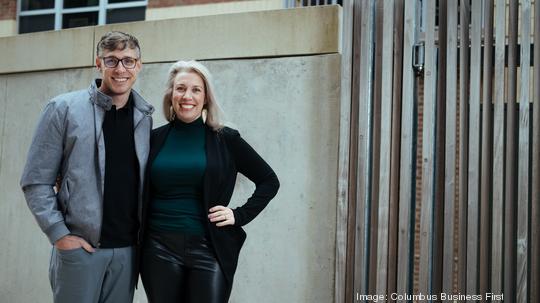
The four-person Worthington startup plans to launch its commercial product this year, said co-founder and CEO Austin Mitchell. Its first customers are “miners” of bitcoin, who consume power to run the computing algorithms that generate the currency. It’s working toward broader use by utilities next year.
“We’re going to be commercializing through all of 2023,” said Chief Administrative Officer Lisa Scott.
Removing payment delays and resulting borrowing and administrative costs could lower utility bills, Mitchell said in a recent talk at Rev1 Ventures, another seed investor. It also can increase access to renewable energy in emerging economies where households lack even basic refrigeration and cookstove power today.
Also this year, Synota will work with infrastructure partners in Nigeria and Cameroon for a demonstration project to build more power plants with bitcoin miners as the first customers. That solves a Catch-22: Today investors won’t back building power plants because there’s not enough revenue if households lack appliances, which they can’t buy because there’s no power.
Mitchell has a doctorate in engineering and energy policy, and worked in forecasting and risk management for energy companies. Scott, his sister, is both an attorney and CPA, and was a tax specialist for a utility infrastructure company.
Deep knowledge of the industry and its regulatory complexities already is “paying dividends,” said Ryan Helon, Rev1’s executive vice president for investment funds. The pair identified an acute pain point, and their solution using bitcoin is “where a lot of investors see the puck going.”
The collapse of cryptocurrency exchange FTX and federal prosecution of its founder can cause increased skepticism and regulatory hurdles, Mitchell said, but removing alleged fraud at the same time is “cleansing.”
Synota is not an exchange, but a “payment rail” much like a credit card, Scott said. Customers can pay in dollars, and because its transactions take place in seconds, fluctuations in bitcoin exchange rates won’t affect it.
See more of the companies were watching in this slideshow:
Startups to Watch 2023
MoveEasy is a previous tenant of Rev1 Ventures's Kinnear Road office space and past client of its advisory services, but Rev1 is not an investor. An earlier version of this story incorrectly described the relationship.

